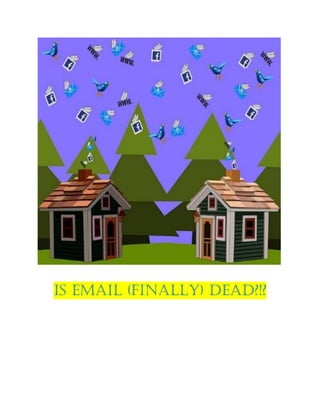Is email finally dead
- 1. Is Email (Finally) Dead?!?
- 2. For years, people in the tech industry have been predicting (or lamenting) the death of email as a form of communication. "Kids don't use email anymore." "There are better, faster and more effective ways to interact with other people, such as texting and social media." "I know people who don't even have an email address." These are some of the most common statements you hear regarding the death of email. (Perhaps it's telling that I've been hearing these same statements for nearly a decade now.)
- 3. The Death of Email? So what's the real deal? Is email actually dead? To answer this question, let me ask one of my own: When was the last time you checked your email account? This week? This morning? Just now? The truth is that most people will go to their email every time their smart phone beeps, vibrates or otherwise indicates that a new email message has just landed in their inbox.
- 4. It's just a natural human response, kind of like when people used to answer their home telephones whenever it rang. It takes some time to de-program it. More Popular than Ever In reality, email is more popular than ever, especially among marketers. According to an April, 2015, study conducted by Yahoo Labs and the University of Southern California called "Evolution of Conversations in the Age of Email Overload", most people are now receiving more emails in their inbox than ever before.
- 5. Part of that is businesses finally catching up with available marketing technology. While many small businesses have been collecting customers email addresses for years, it's only been recently that many have finally figured out what to do with them. People are more willing to give up their email address than they are, say, their mobile phone numbers. That's because they know they can easily ignore or delete emails they don't really want to see. Too Many Emails Today, most people receive more emails than they can conceivably read and respond to.
- 6. Personally, I usually begin each working day by deleting about 80% to 90% of the emails in my inbox, mostly from marketers or others promoting something I'm not interested in. Yet like me, most people won't go to the trouble of unsubscribing from the source of all those emails out of fear that they might miss out on the one offer or email that they genuinely are interested in. Ease of Email It's also easier than ever for people to keep up with their emails. Spam detectors have done an effective job of filtering out the truly irrelevant and unwanted emails.
- 7. And now people can read their emails or at least their subjects and who they are from as a scroll on their smart phones, tablets and other mobile devices. And because more emails today are being sent and received on mobile devices, they tend to be shorter. Perhaps this is why the average amount of time it takes for people to respond to emails sent from smart phones (28 minutes) is so much shorter than those sent from tablets (57 minutes) or from desktop computers or laptops (62 minutes,), according to the Yahoo/USC study. Could that mean that emails and text messages are beginning to morph into the same thing?
- 8. The Myth of Young People and Email As expected, older people tend to use emails more than younger people. But the difference may not be as big as many people might think. During the course of the study, 53% of adults between 35 and 50 years old sent emails from their phones or tablets at least once, compared to only 49% of teenagers between13 and 19 and 48% of young adults between 20 and 35 years old. Older people (51+) sent the fewest emails via mobile devices, at 43%, according to the study. So email is definitely not dead. It's not even wounded.
- 9. Eventually, however, it may eventually morph into something entirely different, in the way the telephone did. By the way, to send email for your IM business you'll need an autoresponder. My favorite autoresponder company to use is Aweber, deliverability is awesome (although your message may end up in the Promotions folder), the price is right and the service is second to none! Check out Aweber now at: Aweber Email Marketing Thanks for reading, Have a nice day Jim & Gloria Moore / http://clubhost.net








